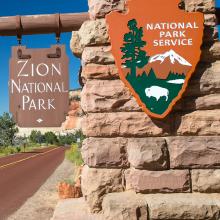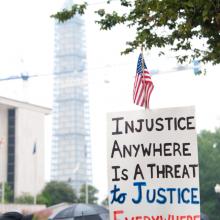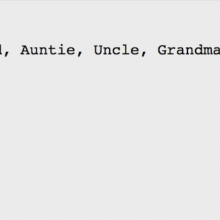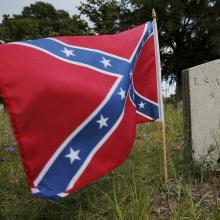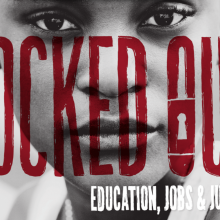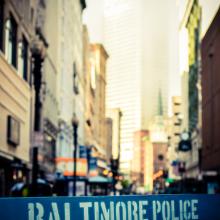racial justice
Parks and monuments tell our nation’s stories and shape our collective memory. Our national parks, forests, monuments, and wildlife areas are where we learn, play, and pray. We treasure these places of beauty that reveal the wonders of our Creator. And today, on the centennial celebration of the National Park Service, we must pass on their spiritual and cultural significance from generation to generation.
Unfortunately, many people in the U.S. do not yet find their stories reflected or protected in our system of national public lands. While there are plenty of sites that honor military leaders or white historical figures like Abraham Lincoln and Thomas Edison, there are far fewer sites that honor Native American, African-American, Latino, Asian-Pacific Islander, or women’s history.
At Washington National Cathedral on Sunday, an interracial group of clergy gathered to discuss the role of the white church in perpetuating racism. And what the church might do to heal the wounds. A tough subject, but dealt with unflinchingly
Why We Can’t Wait is the familiar title of Martin Luther King Jr.’s book from 1964. The volume includes his famous “Letter from Birmingham Jail” (written April 16, 1963) and makes an argument to recognize 1963 as the beginning of “the Negro Revolution” while extolling the effectiveness of nonviolent resistance.
King’s “Letter” issues a call for urgency. He wrote it as a response to eight local white clergymen who had criticized his activities in Birmingham and appealed for a more patient and restrained approach to lobbying for civil rights. The “Letter” expresses King’s deep disappointment with “the white moderate,” who “paternalistically believes he can set the timetable for another man’s freedom.”
This week Asian-American women leaders at American University in Washington, D.C., released a video of local Asian Pacific Islanders reading a letter of solidarity in support of the Black Lives Matter movement.
The collaborative letter was drafted online last month as Asian Americans across the country responded to the shootings of Philando Castile and Alton Sterling, black men killed recently by police officers.
I want to encourage us to consider the ways we can engage our neighbors beyond an effort to provide a sense of comfort or peace. I believe we are called, in whatever small way we can, to not only accompany them in their grief, but also to acknowledge, validate, and recognize the injustice or atrocities that occur — and to seek to take action to address this within our own sphere of influence.
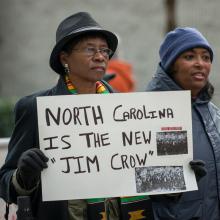
Moral March in Raleigh, N.C., in Februar 2014. EPG_EuroPhotoGraphics / Shutterstock.com
Since the summer of 2013, we have called this law — which the 4th Circuit struck down on Friday — a monster voter suppression bill. It was the first and the worst of many voter suppression measures to pass through state houses since the Supreme Court’s Shelby decision stripped the Voting Rights Act of its power to guarantee fair elections in this country. In many ways, it performed the new Southern Strategy of James Crow, Esq., which attempts to hold onto power as white voters become one among many minorities in this country. It is a strategy that necessarily depends on old fears, racism, and divide-and-conquer tactics.

Ruslan Grumble / Shutterstock
AS THE BLACK LIVES Matter movement has shone a light on police brutality against black people across the country, the public conversation in the United States has been unable to ignore the legacy of racism that shapes many of our nation’s most vital institutions. In his important new book, The End of White Christian America, Robert P. Jones, CEO of the Public Religion Research Institute (PRRI), makes the bold claim that White Christian America (WCA)—the fertile ground that gave root to and energized the legacy of American racism—is dead. Granted, this does not mean the death of racism. But for those of us striving for racial reconciliation, the changing societal narrative that Jones offers here is a hopeful one.
Jones begins the book with a tongue-in-cheek obituary for WCA: “Although examiners have not been able to pinpoint the exact time of death, the best evidence suggests that WCA finally succumbed in the latter part of the first decade of the 21st century.” He ends the book with a eulogy for WCA that is much more serious in tone and draws upon the stages of grief named by Elisabeth Kübler-Ross in her eminent book On Death and Dying.
Jones defines the WCA as a distinctly Protestant entity, with two primary branches, white mainline Protestants and white evangelical Protestants. Jones notes that although these two subgroups are often at odds, together they comprise the “single dynasty” of WCA. “For most of the nation’s life, White Christian America was big enough, cohesive enough, and influential enough,” Jones writes, “to pull off the illusion that it was the cultural pivot around which the country turned.”

Children sing at the community-organizing camp in Durham, N.C. Photo via Franklin Golden / RNS
Instead of the traditional vacation Bible school, this downtown church partnered with seven other congregations — black, white, Baptist, Jewish, Episcopal, Pentecostal, and nondenominational — to put on a community-organizing camp for kids aged 4 to 12.
What if these were not our foundations? What if these foundations did not lay the groundwork for philosophical and legal frameworks that created separate and unequal schooling for the next 150 years? What if they did not lay the foundations for racialized de-facto exclusions from the Homestead Act and the G.I. Bill. And what if they did not lay the foundations for environmental and climate injustice that causes heightened hardship in communities with less healthcare and fewer resources. And what if they did not lay the foundations for 1.5 million black men to go missing from black communities, families, churches, and civic structures — prized booty of America’s racialized Drug War and a new source of near free labor for American corporations within state and federal prisons.
The Southern Baptist Convention, born in 1845 in a split over its support for slavery, passed a resolution calling for Christians to quit using the Confederate flag.
“We call our brothers and sisters in Christ to discontinue the display of the Confederate battle flag as a sign of solidarity of the whole Body of Christ, including our African-American brothers and sisters,” reads the resolution adopted Tuesday at the convention’s annual meeting in St. Louis.

Image via Rena Schild/Shutterstock.com
There is change for racial justice and equity in the air in Boston, to an extent that I previously only hoped for but could not heretofore have envisioned. And as I look ahead to attending Sojourners’ upcoming leadership Summit, which focuses on the intersections and implications of race across numerous justice issues, I expect and pray for change to be in the air in D.C., and that the same winds may fill our sails in June.
Black Americans’ educational equality has improved in the last year, but college graduation rates and access to high-quality elementary and secondary education remains a problem, according to a major survey by the National Urban League — which wants Congress to ramp up early childhood education and provide more federal aid to black college students.
Eight years into the nation's first African-American presidency and amid an increasingly racialized election cycle, what can we say about the state of black America? According to a new report by the National Urban League, it’s mixed: African Americans have made strides but a clear opportunity gap persists.
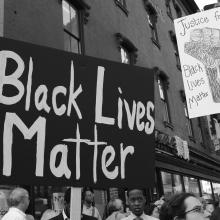
Image via Stephen Melkisethian/Flickr.
In the last year, the group has met with civic leaders, including four mayoral candidates, police commissioner Kevin Davis, and the governor’s Justice Reinvestment Coordinating Council, the council tasked with crafting a plan to reduce the prison population in Baltimore. Several leaders, including Archbishop Lori, went to West Baltimore following the protests to help clean up and lead services. Imam Earl El-Amin of the Muslim Community Cultural Center of Baltimore said several members had developed a relationship with a seniors’ building during the uprising, sharing medicines and food. Rev. Deckenback’s church has been accepting donations over the last year for areas impacted by protests.
New initiatives are seeking to curb what is often portrayed as a growing epidemic of heroin use in America. But as Ekow Yankah wrote in a brilliant piece last month, titled “When Addiction Has a White Face" this new attention to the plight of the addicted and the justification from law enforcement that “these are people with a purpose in life” has only come when the faces of addicts are no longer black and brown, but white.
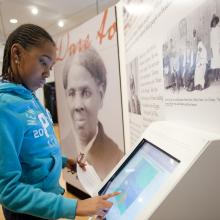
Image via Smithsonian Institution Traveling Exhibition Service/Flickr
Putting Harriet Tubman on the $20 bill isn’t going to fix any of this. But I find it hard to not be excited that a strong black woman is being honored for being a strong black woman. Is a $20 bill an imperfect vehicle for this recognition? Yes. But I’m encouraged by the fact that the U.S. at least wants to appear as if celebrating black people is a normal thing to do.

Flint River. Linda Parton / Shutterstock.com
While Michigan Gov. Rick Snyder has admitted that mistakes have been made and takes full responsibility, the residents of Flint to this day have not found remedy. His initial action was to have city fire stations serve as bottled water and water filter distribution points. Michigan National Guard personnel provided water to residents there.
And the nation knows the crisis — high lead levels in children’s blood tests and a spike in Legionnaires disease.

Ebenezer Baptist Church in Atlanta. L. Kragt Bakker / Shutterstock.com
I believe pulpits are supposed to change communities and nations — and history. They are supposed to raise up preachers and their congregations to stand and speak and act for biblical justice. I have been very blessed on this tour for my new book, America’s Original Sin: Racism, White Privilege, and the Bridge to a New America, by preaching and being in many of those pulpits that are changing things yet again.
As a black person who has lived and worked in struggling cities like these for most of my adult life, I know that the stakes are high in Baltimore. As a black mom, I will have to teach my child what to do if stopped by the police, even though I have no fear that she will ever commit a crime. As the wife of a black man, I wonder if he will be hassled by the police for shoveling our driveway. As a parent who chose to move to the city to give our child the opportunity to have peers who look like her, I know that I am blessed with choices and resources. For those who lack choices and resources, effective leadership is even more crucial.
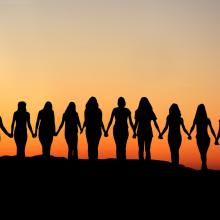
Image via Hannamariah/Shutterstock.com
Though God originally intended that humankind experience goodness and abundance, forces that seek to counter the divine will of God continue to struggle. The divine will of God is for God’s children to prosper, live in peace, unity, and attain equity of God’s resources. God in infinite wisdom established a plan for reconciliation to the disruption in social order before the foundation of the earth.
In this way, God took a stand for what mattered: against the evil that coopted the human experience by way of sin; for God children’s to all have equal access to the graces and life available that came through acceptance, profession of faith, and obedience.
It is no secret that in today’s culture, there is an outcry that resembles the prophetic witness of taking a stand for what matters.
